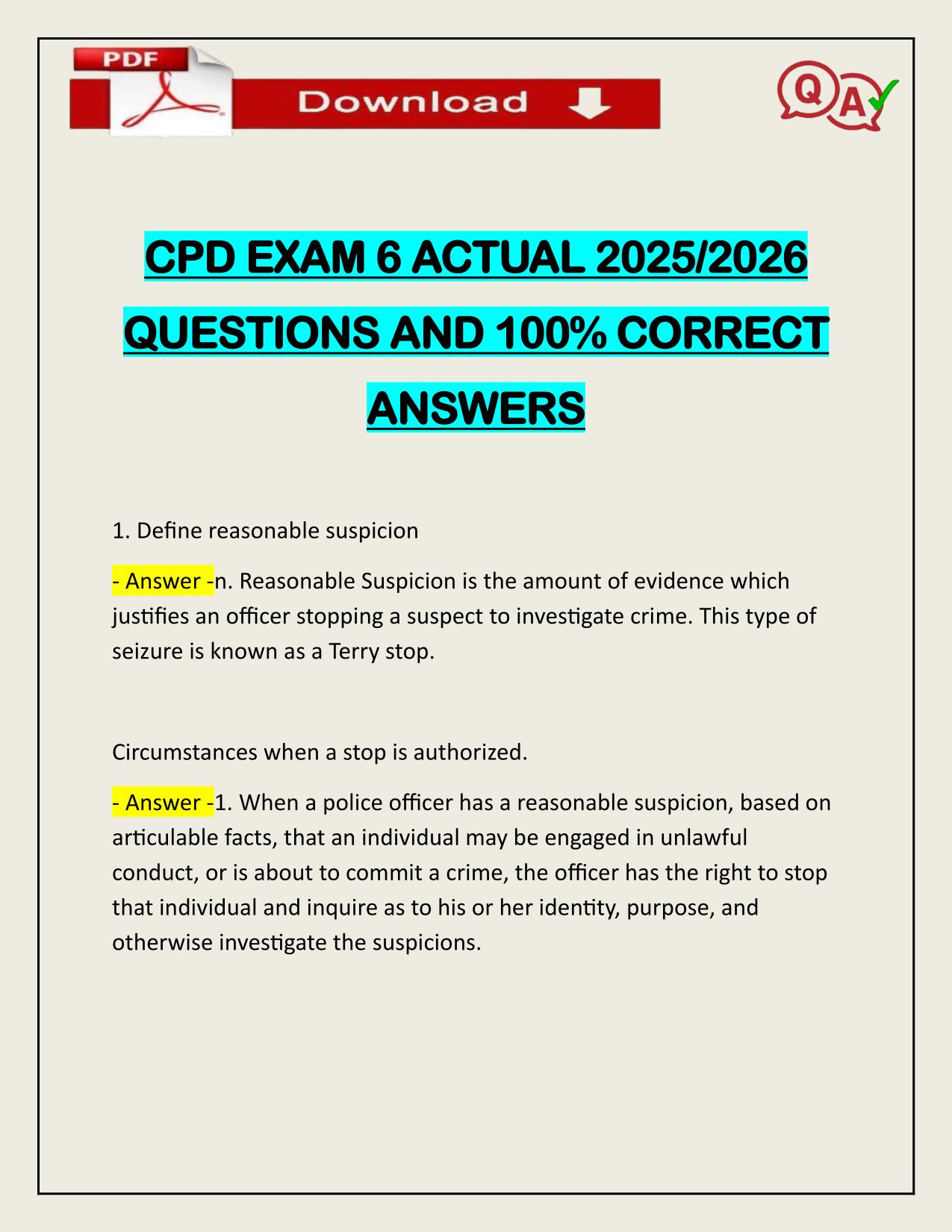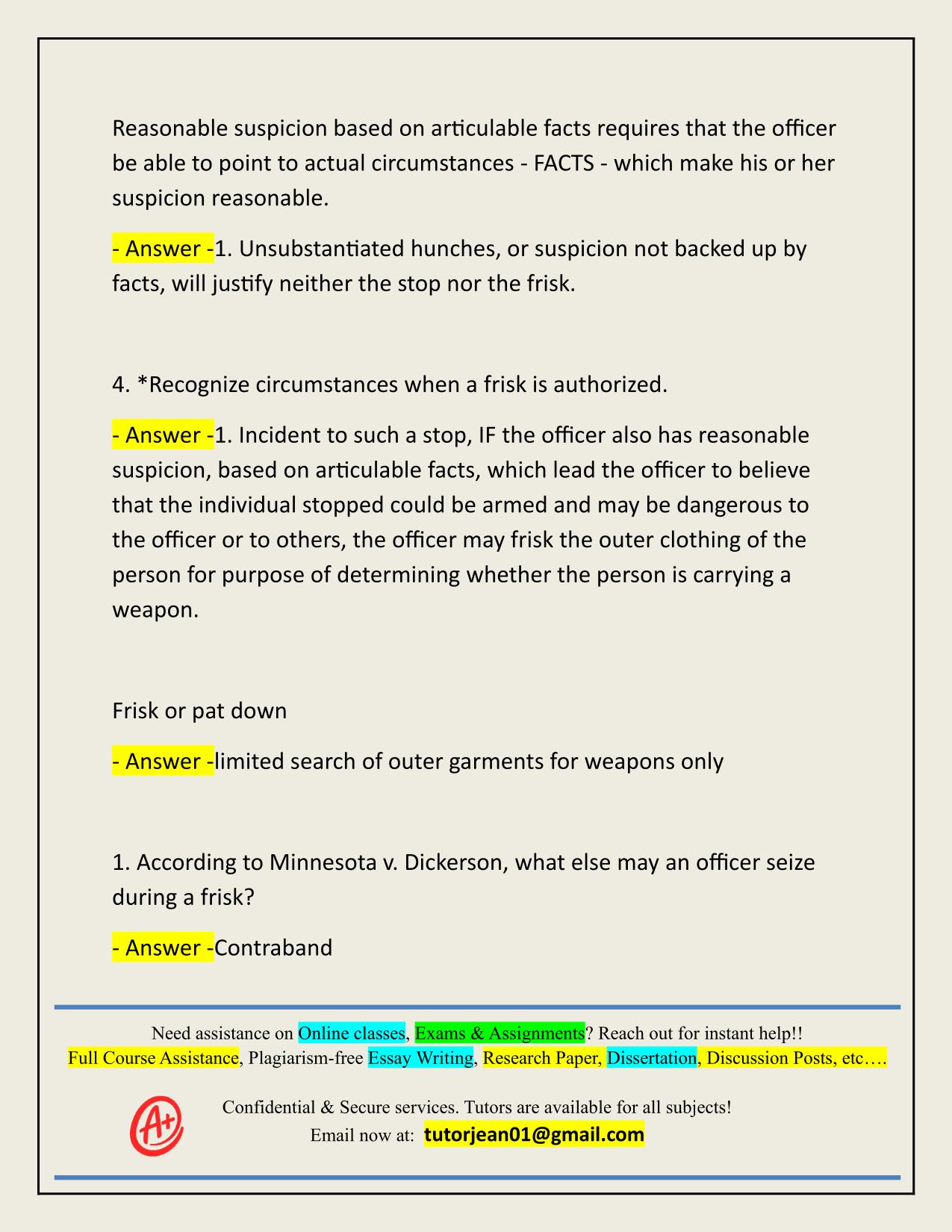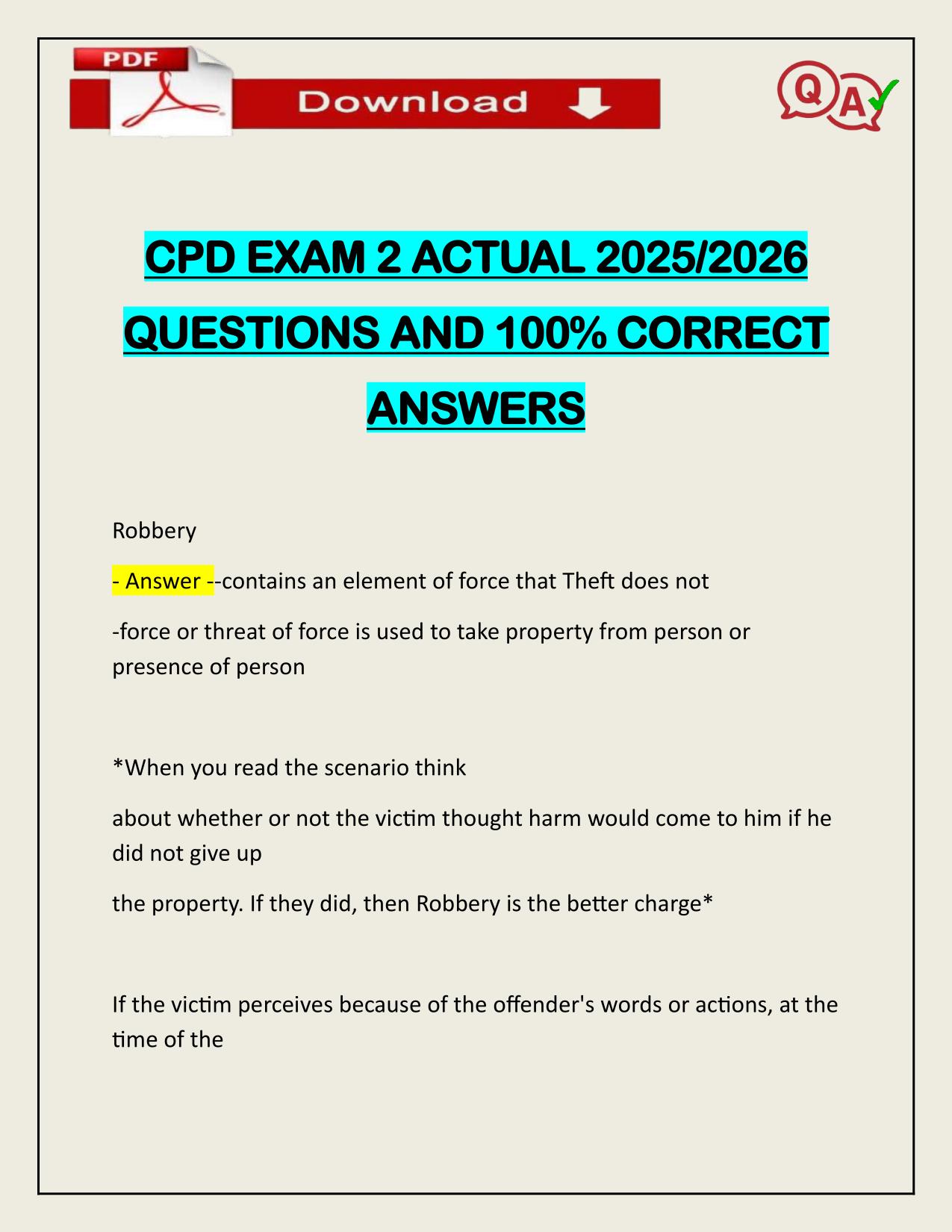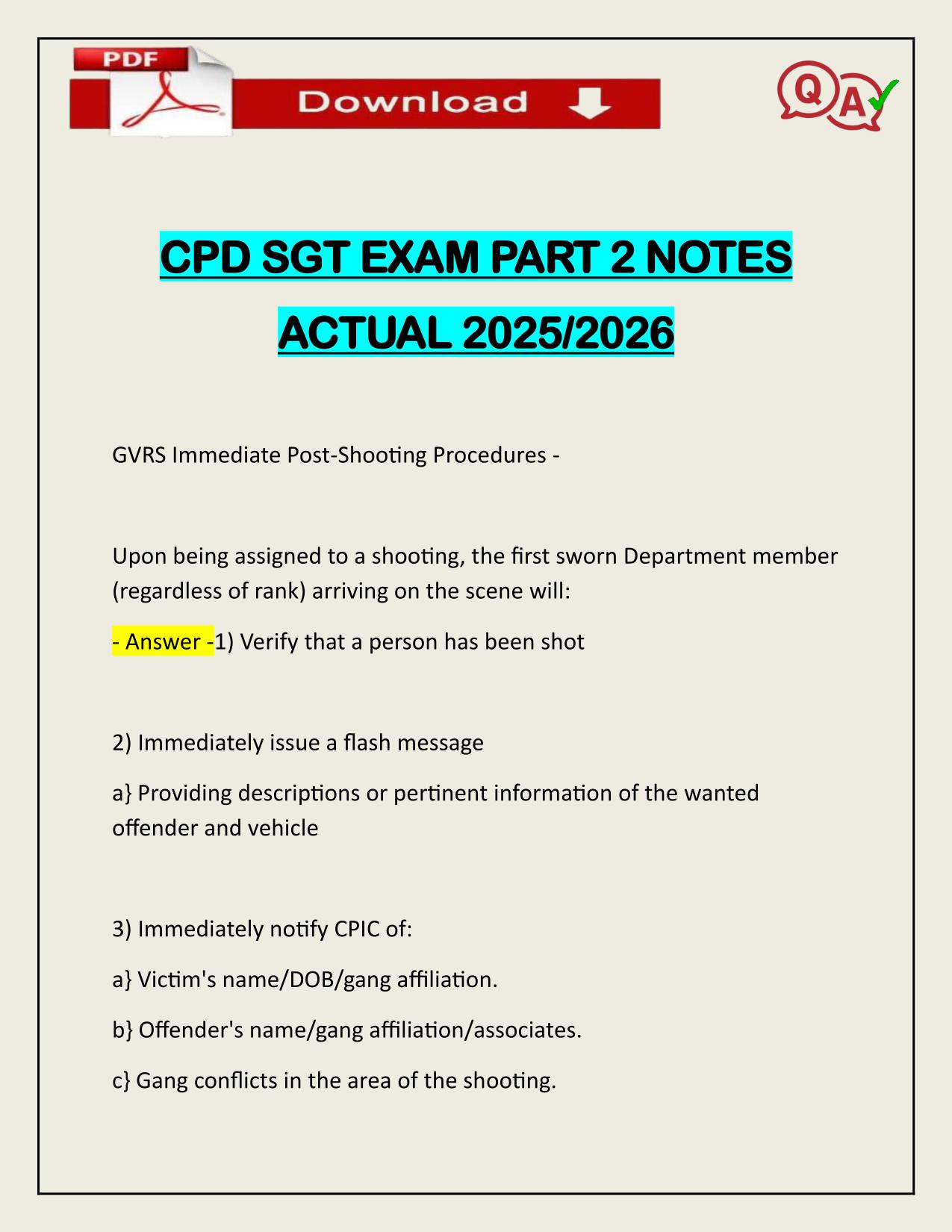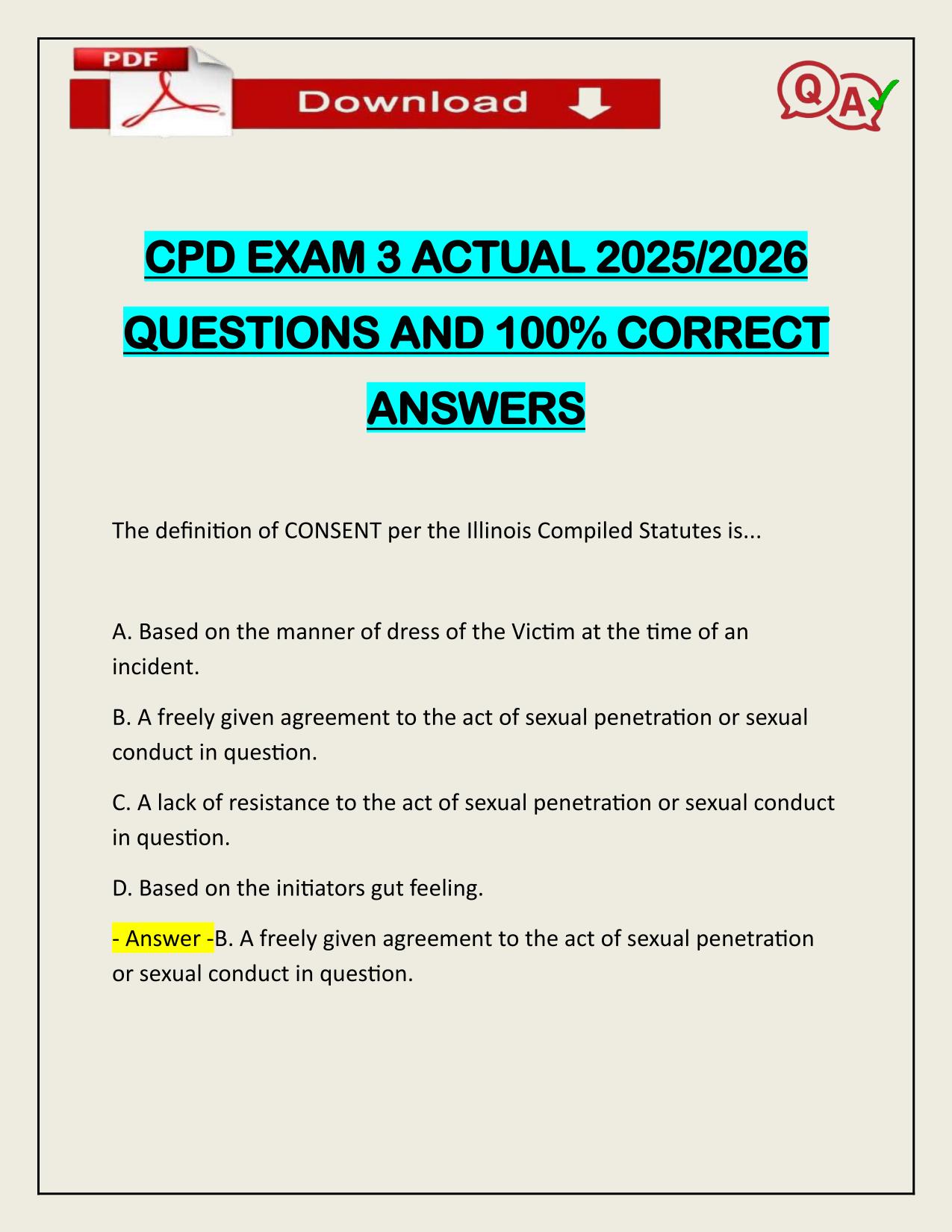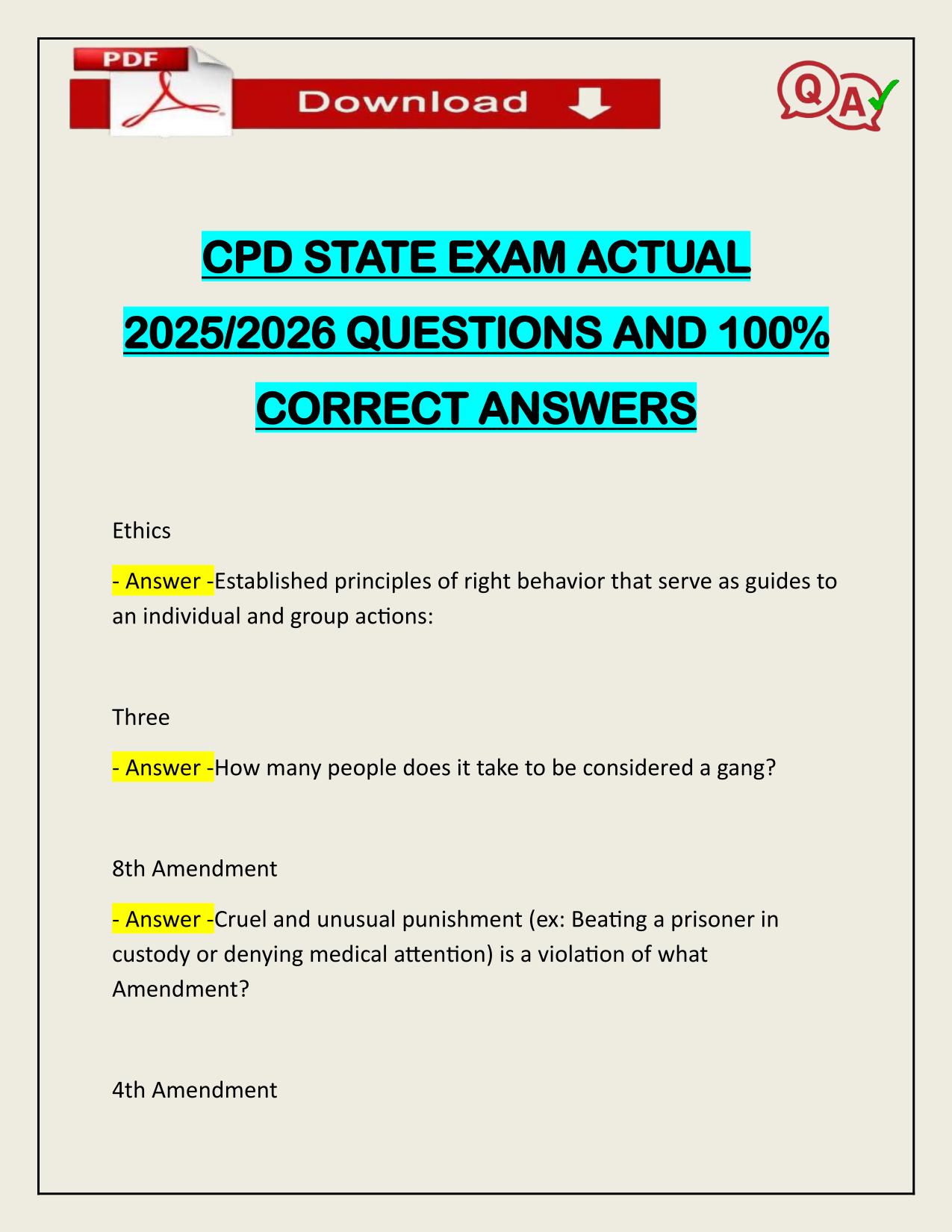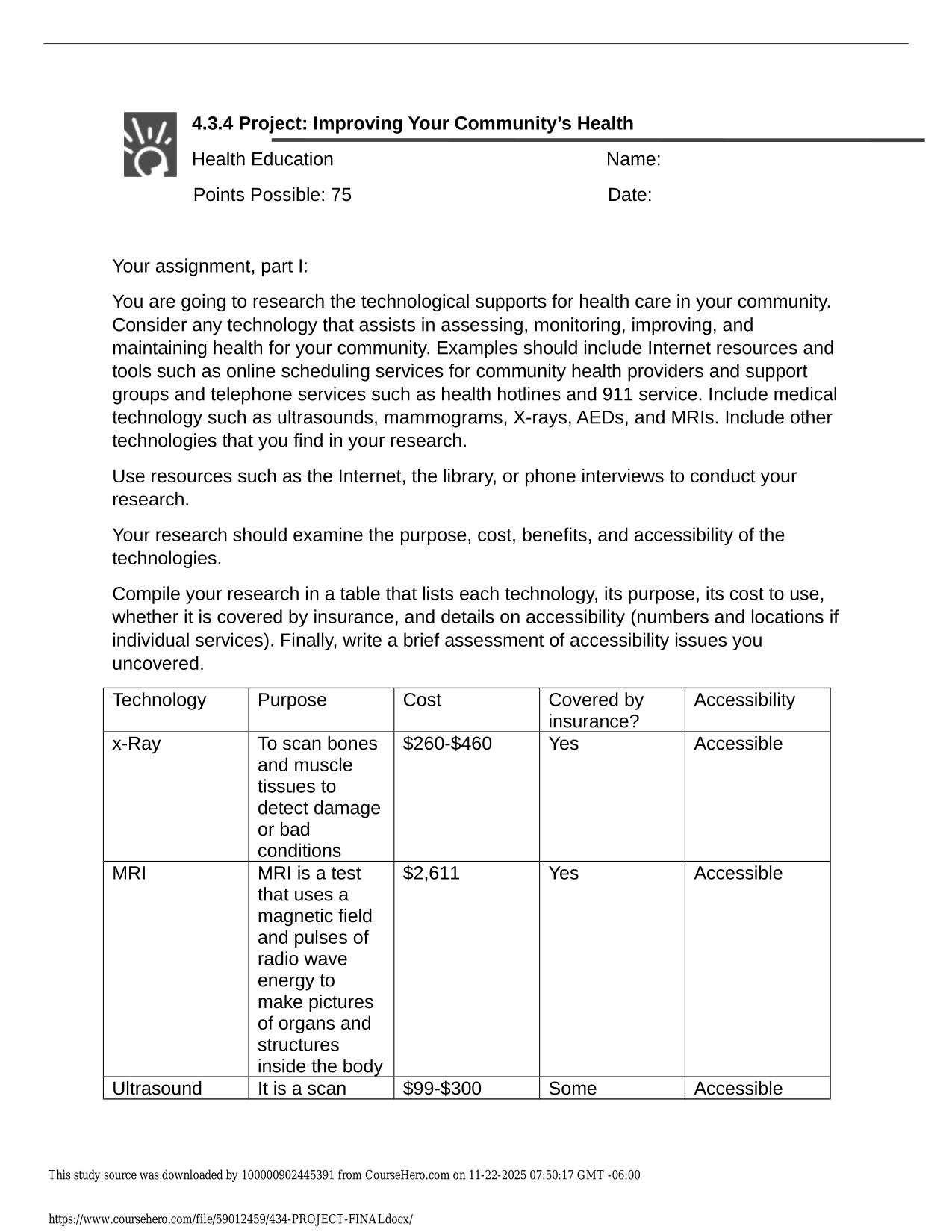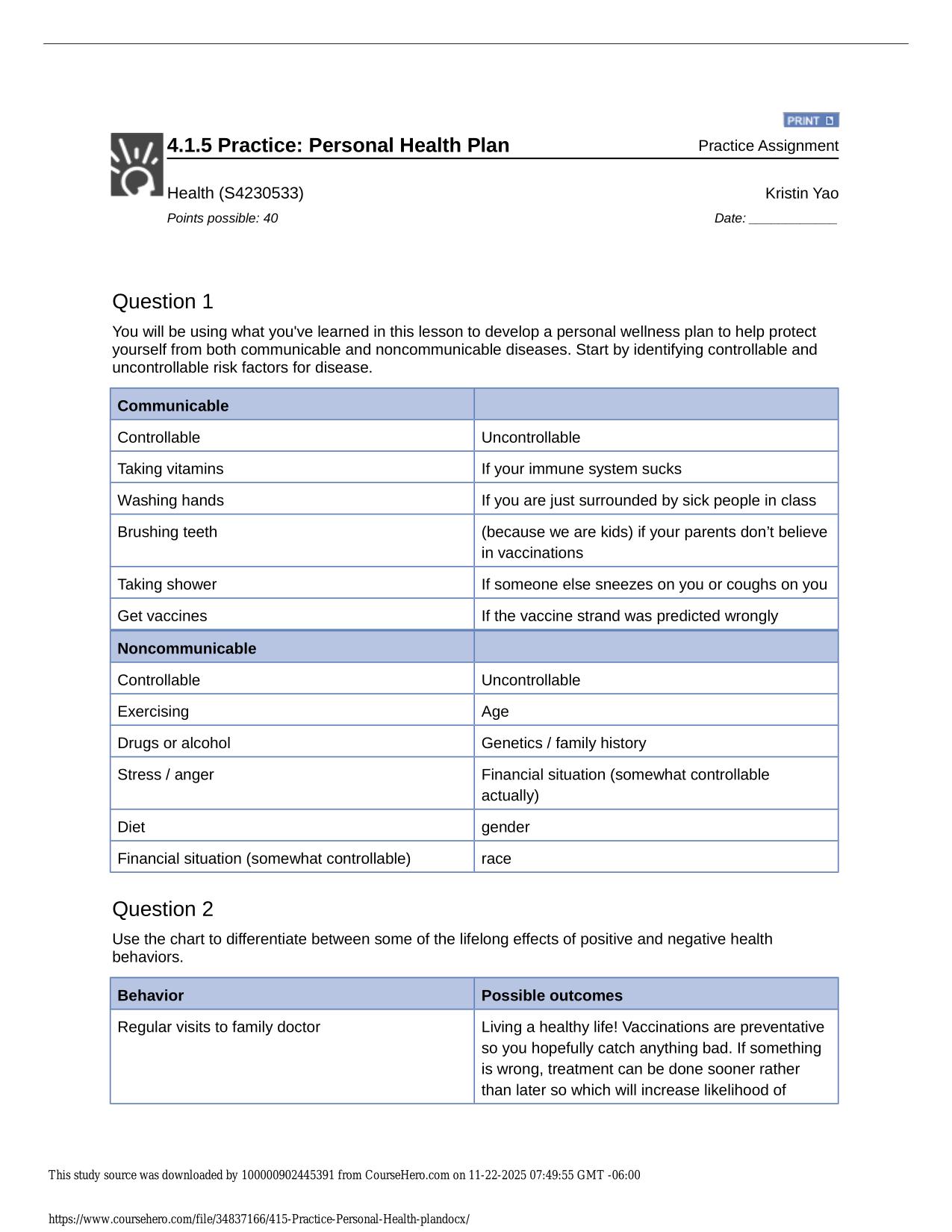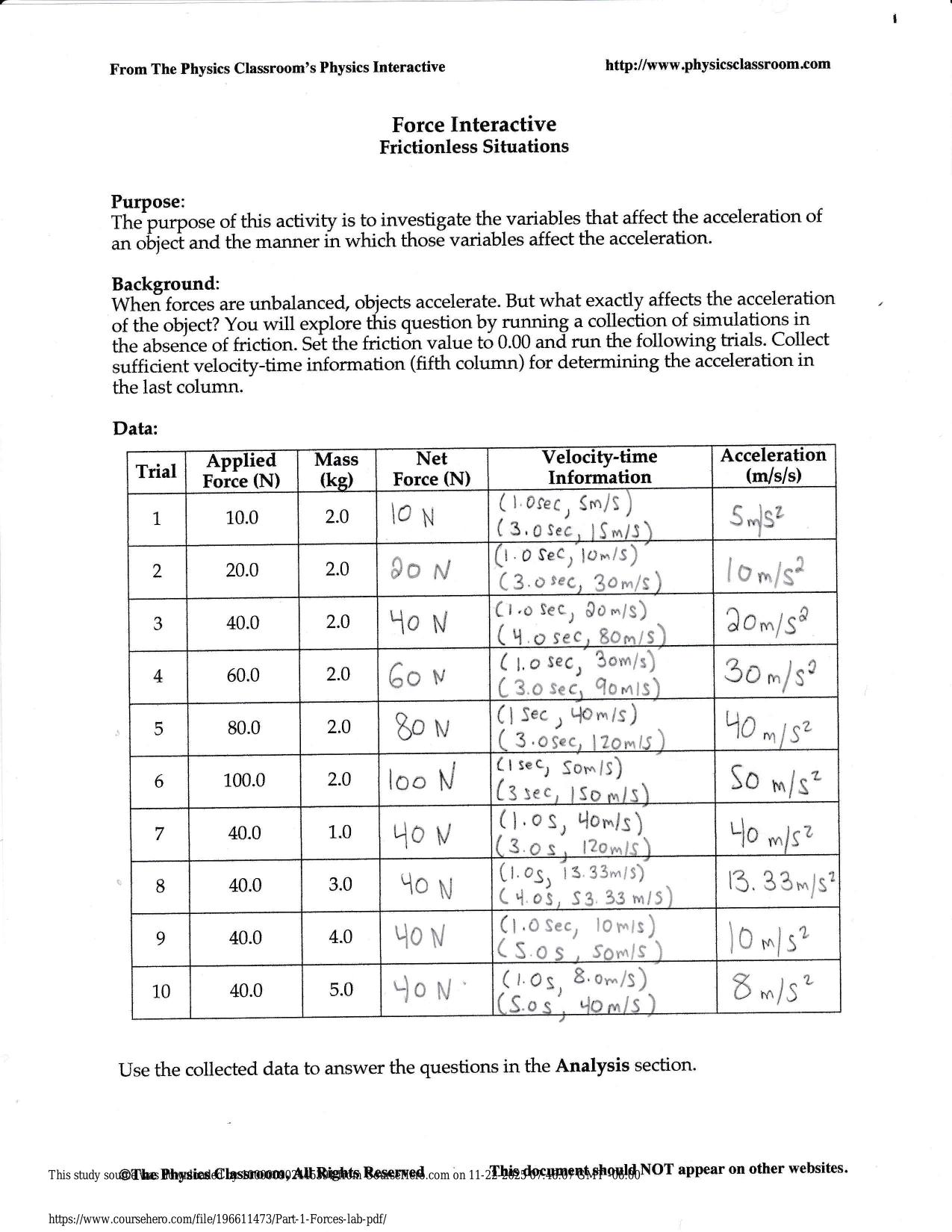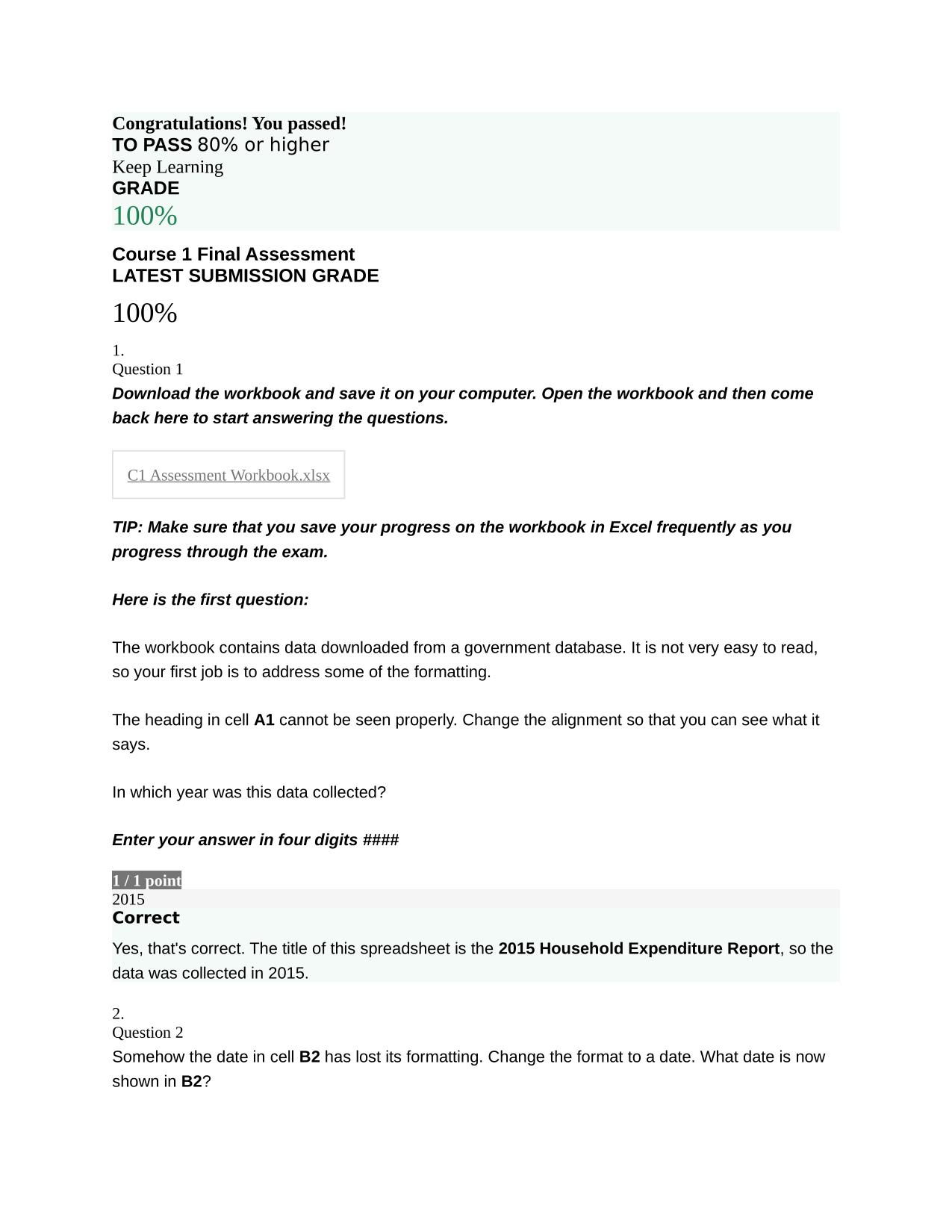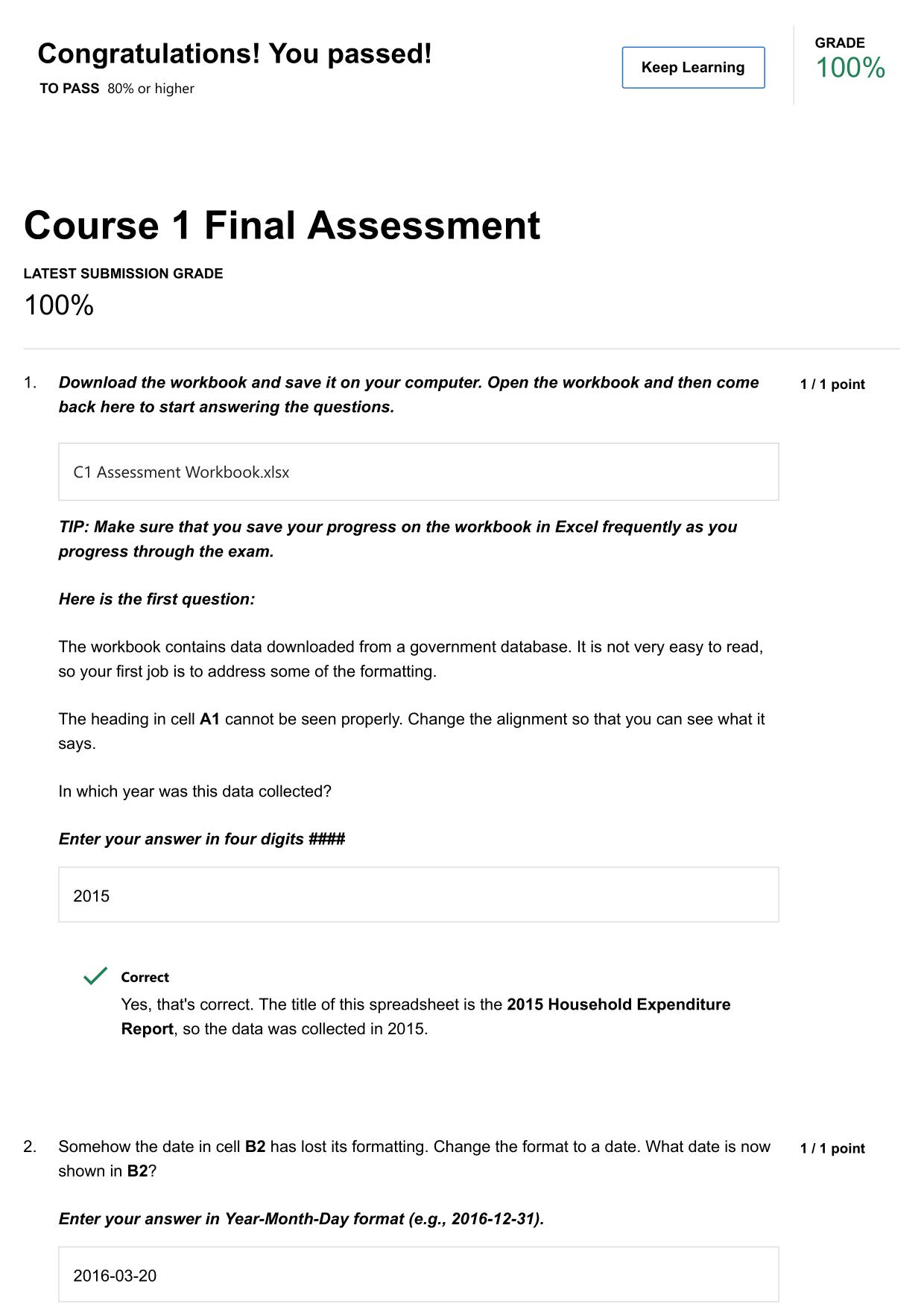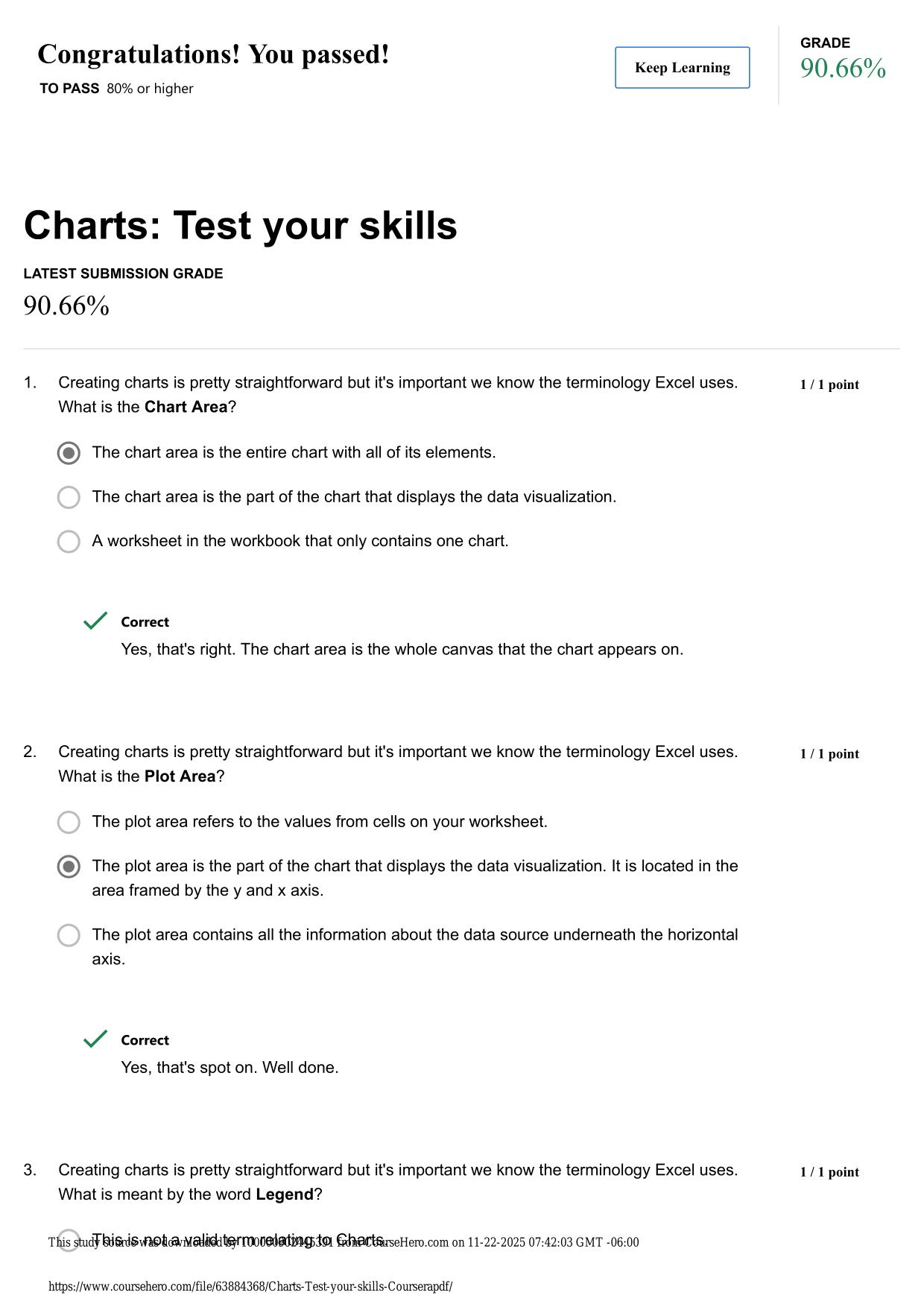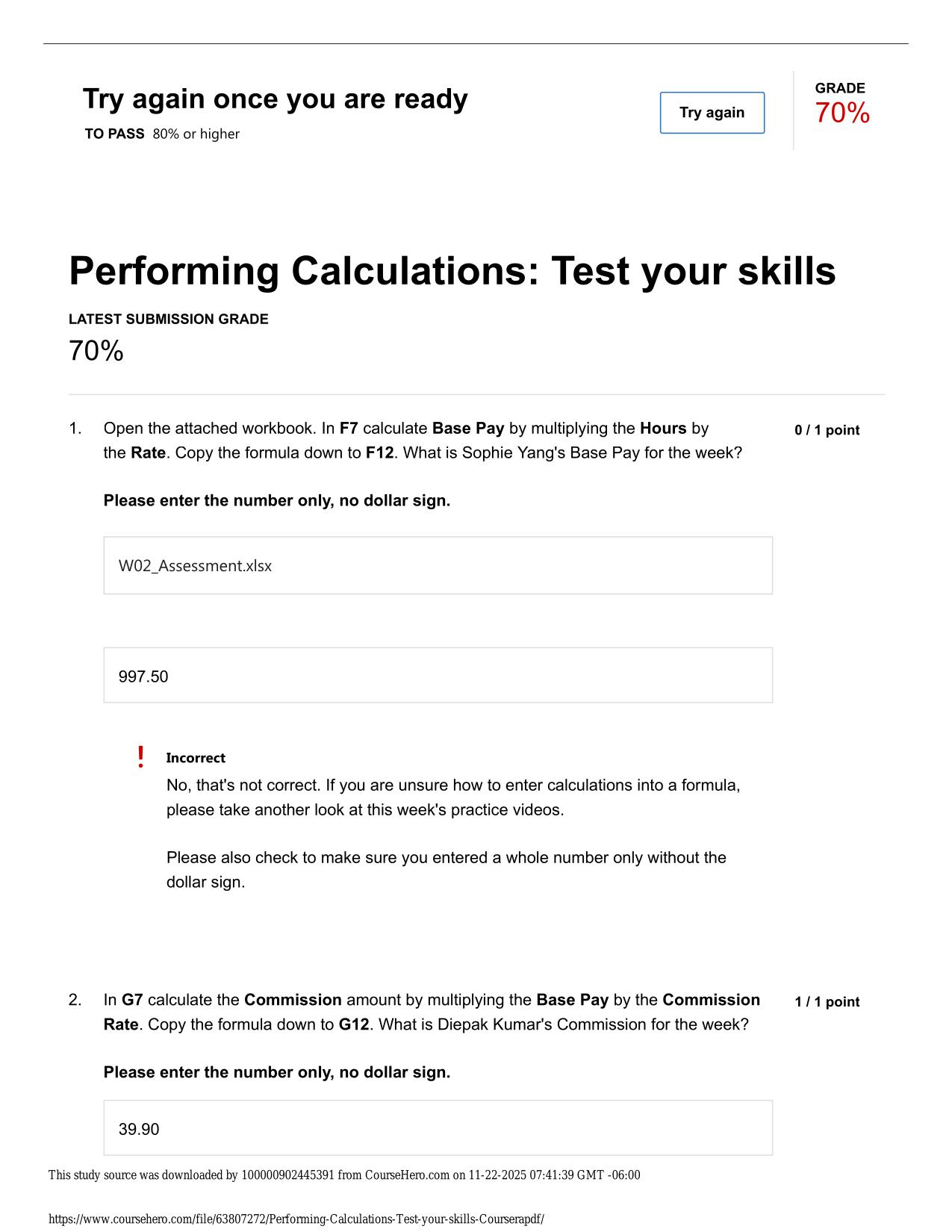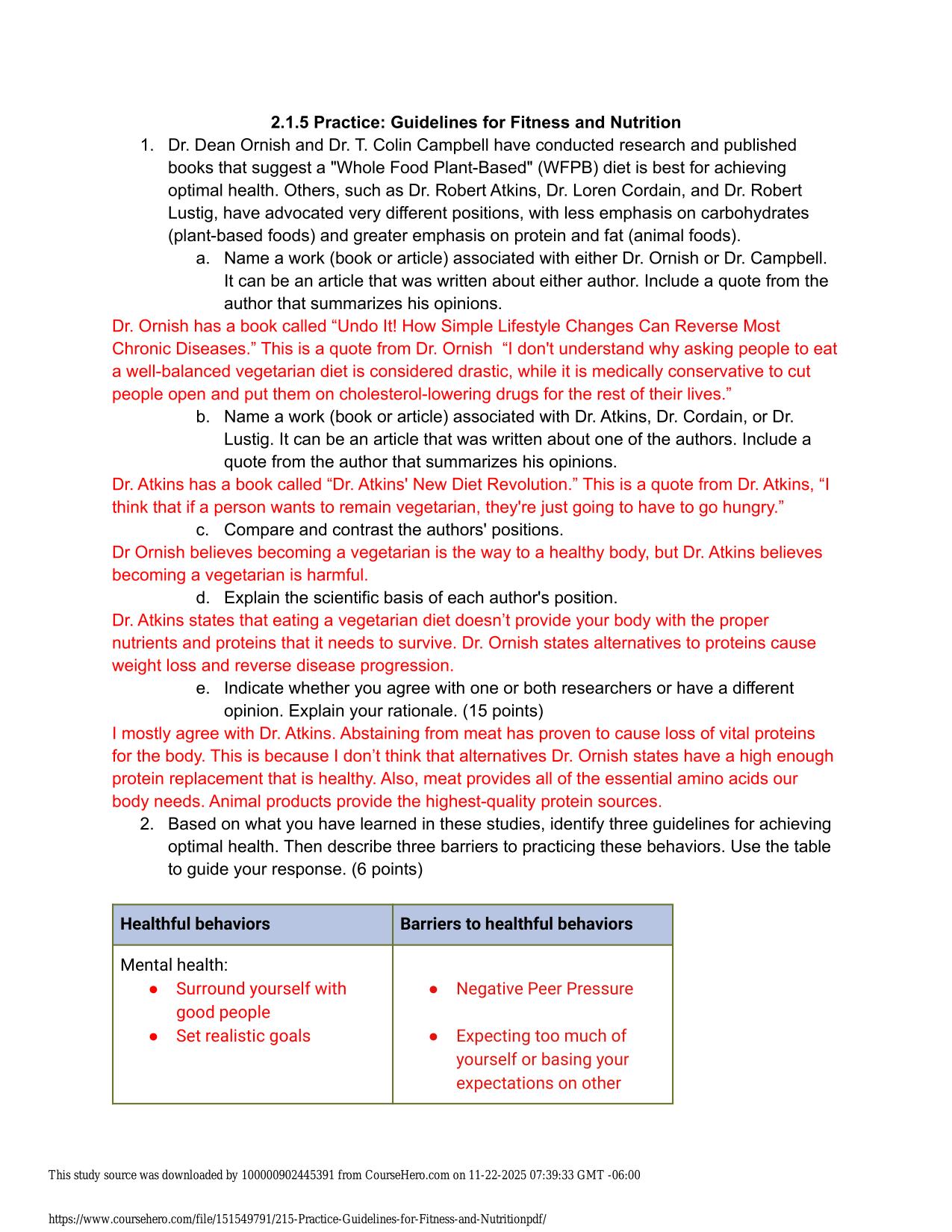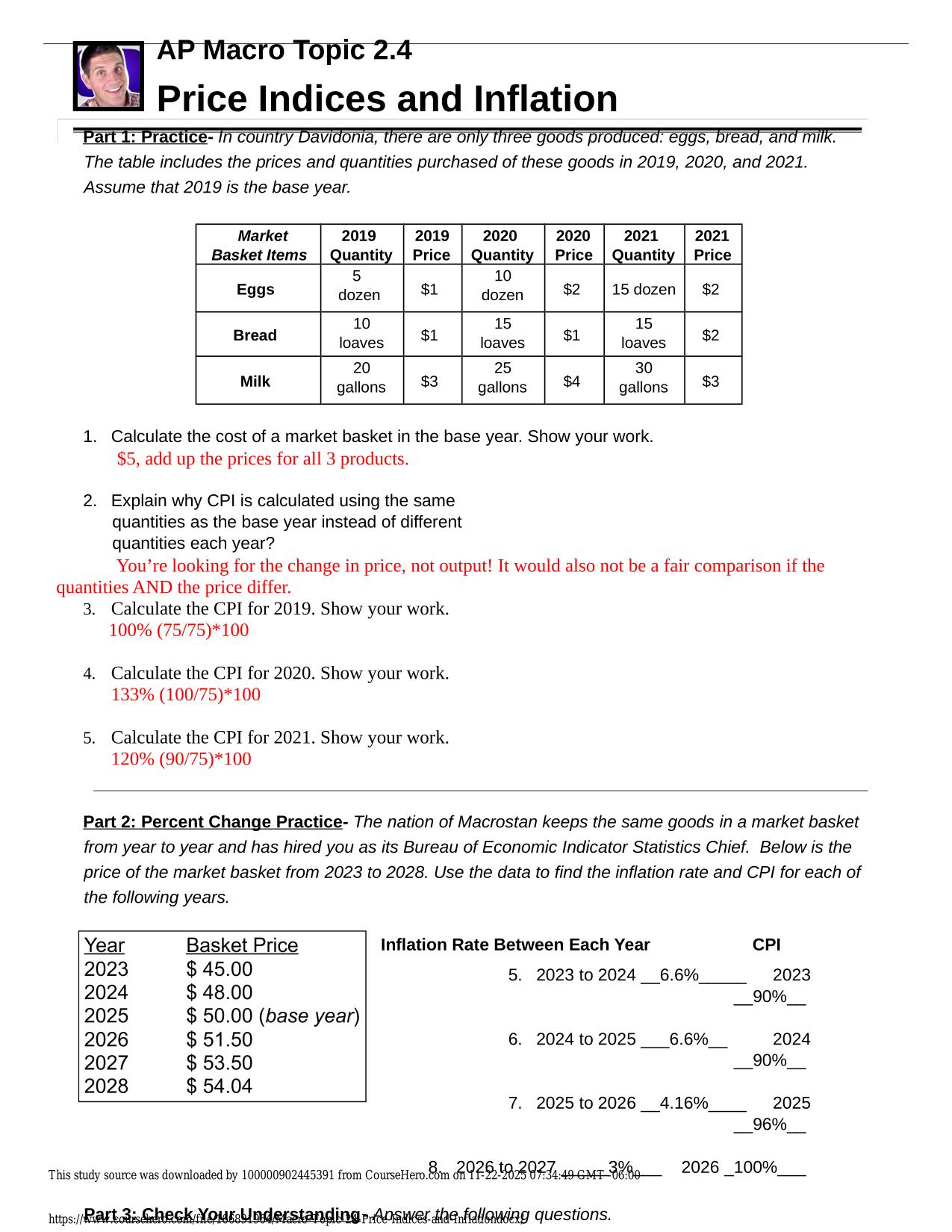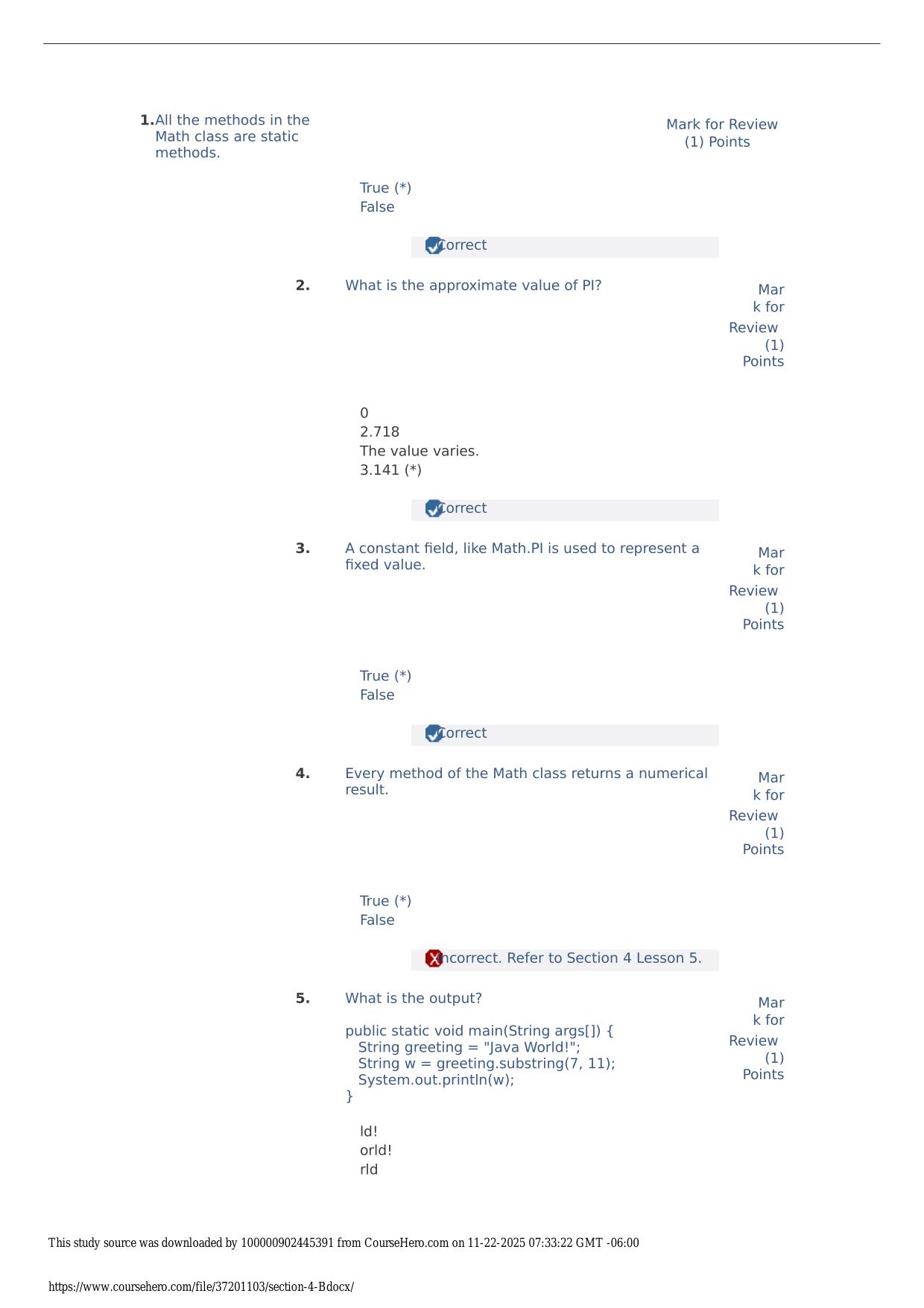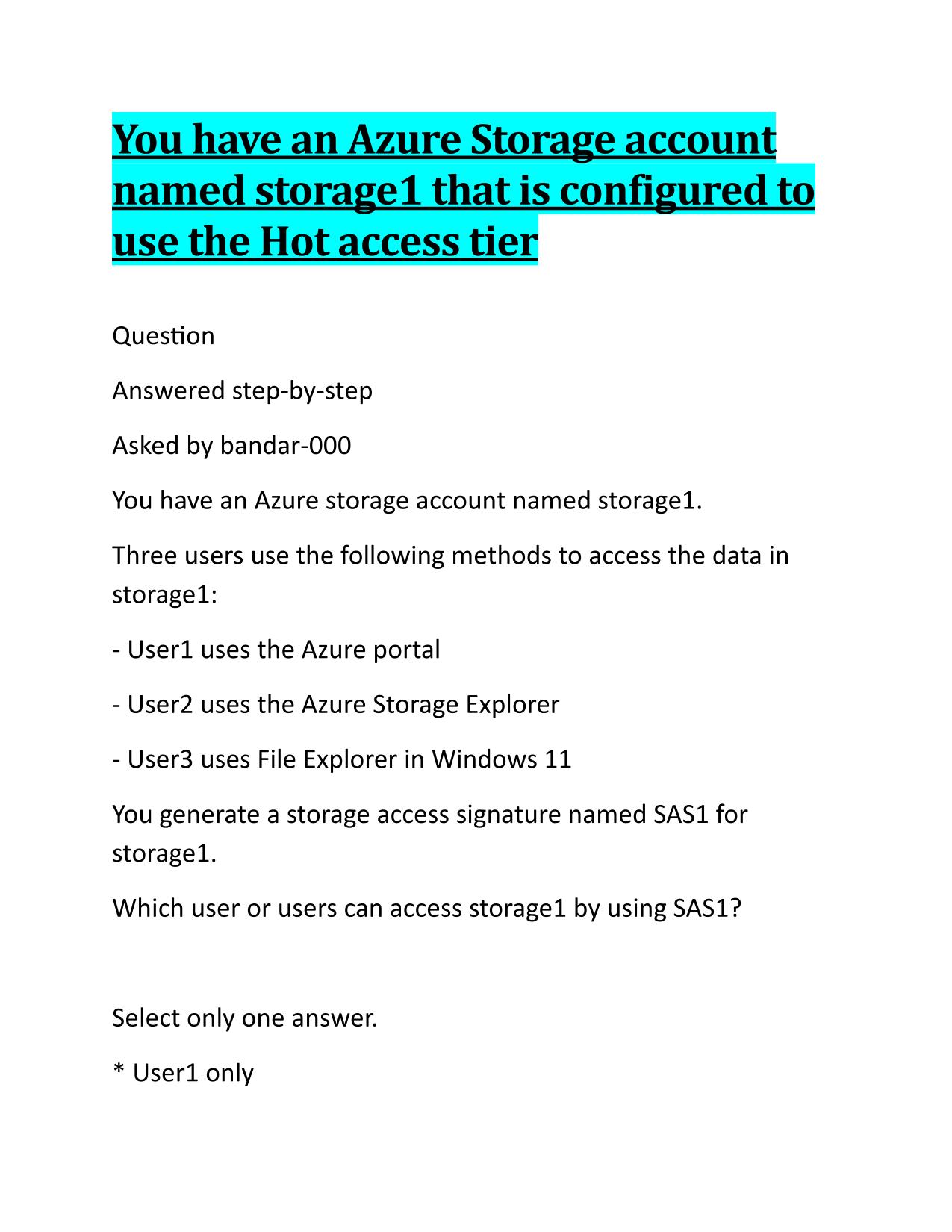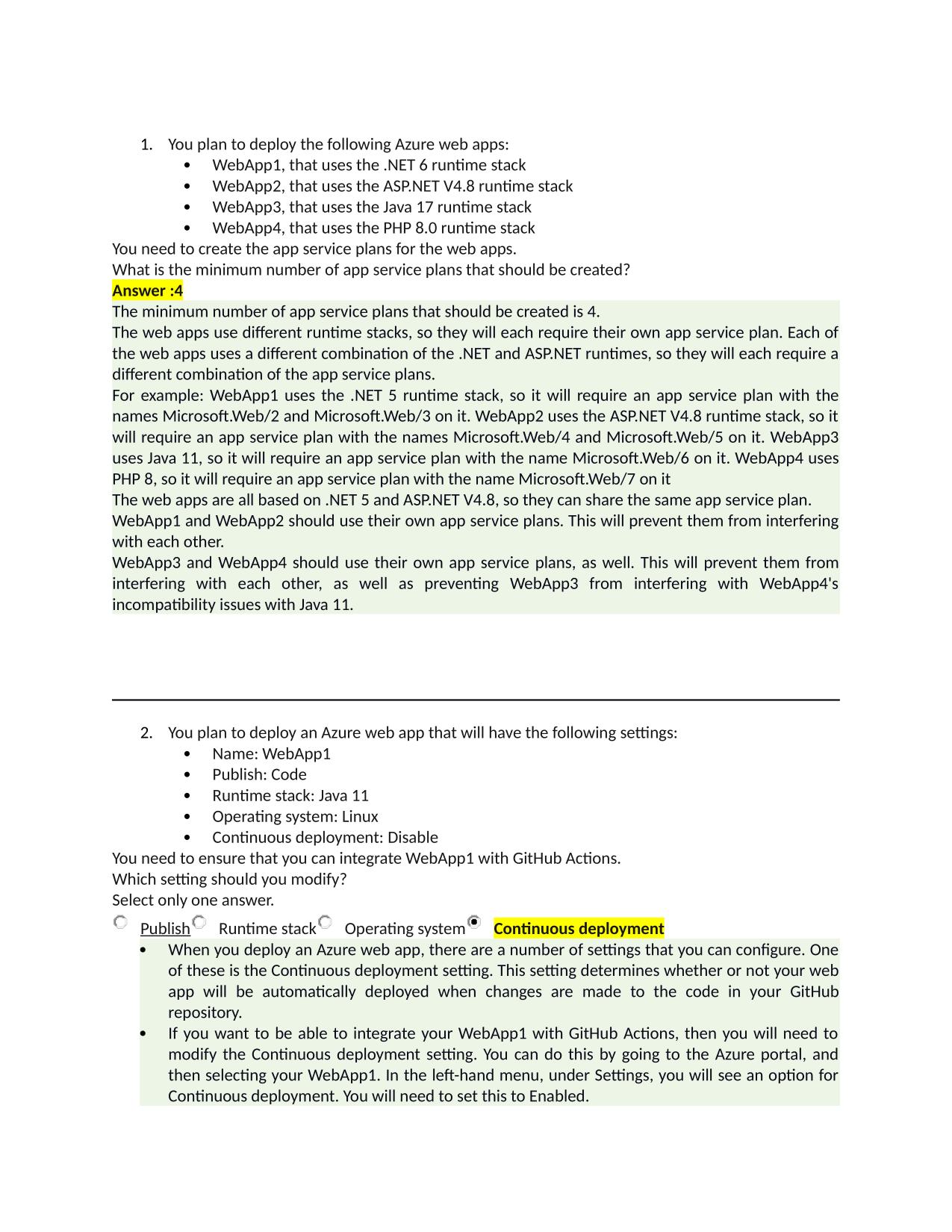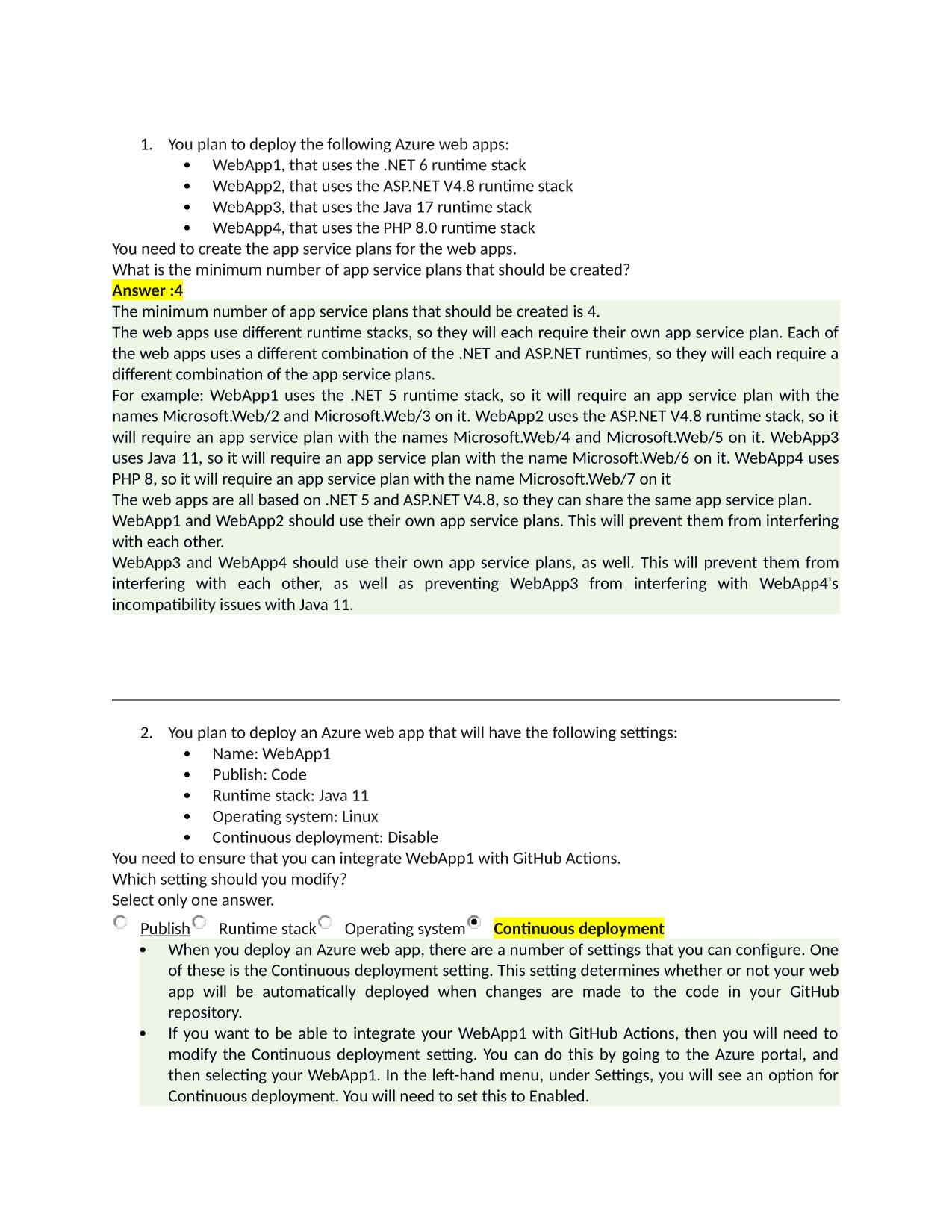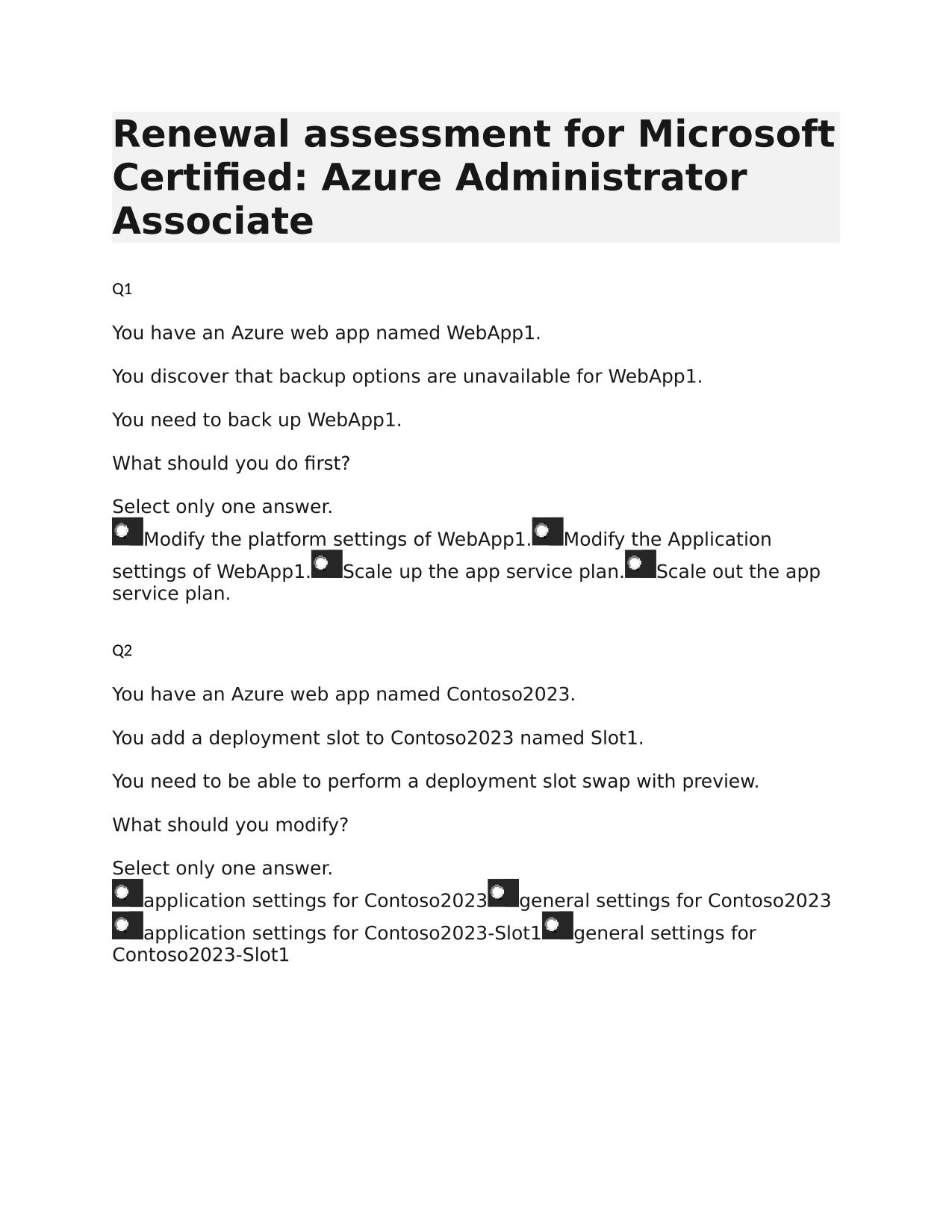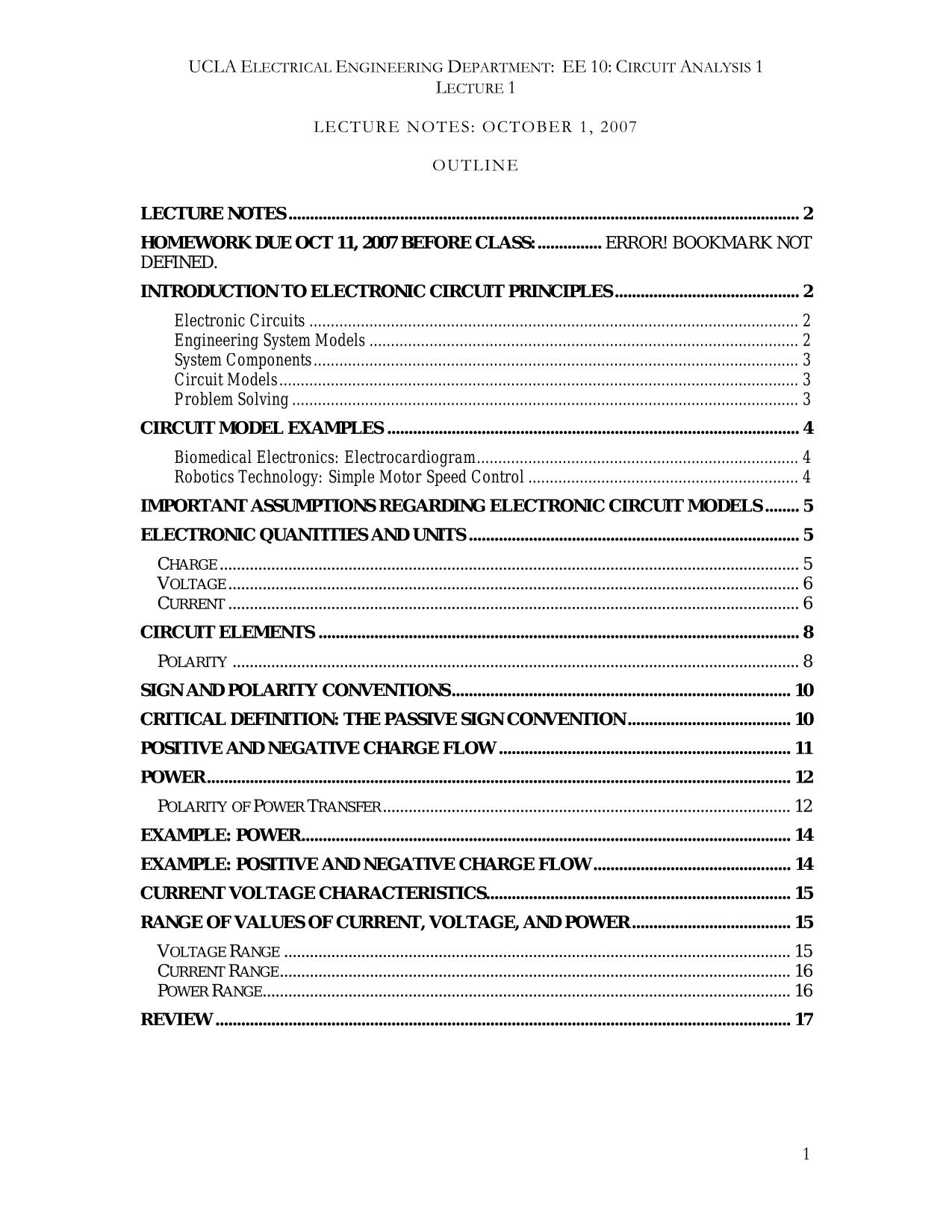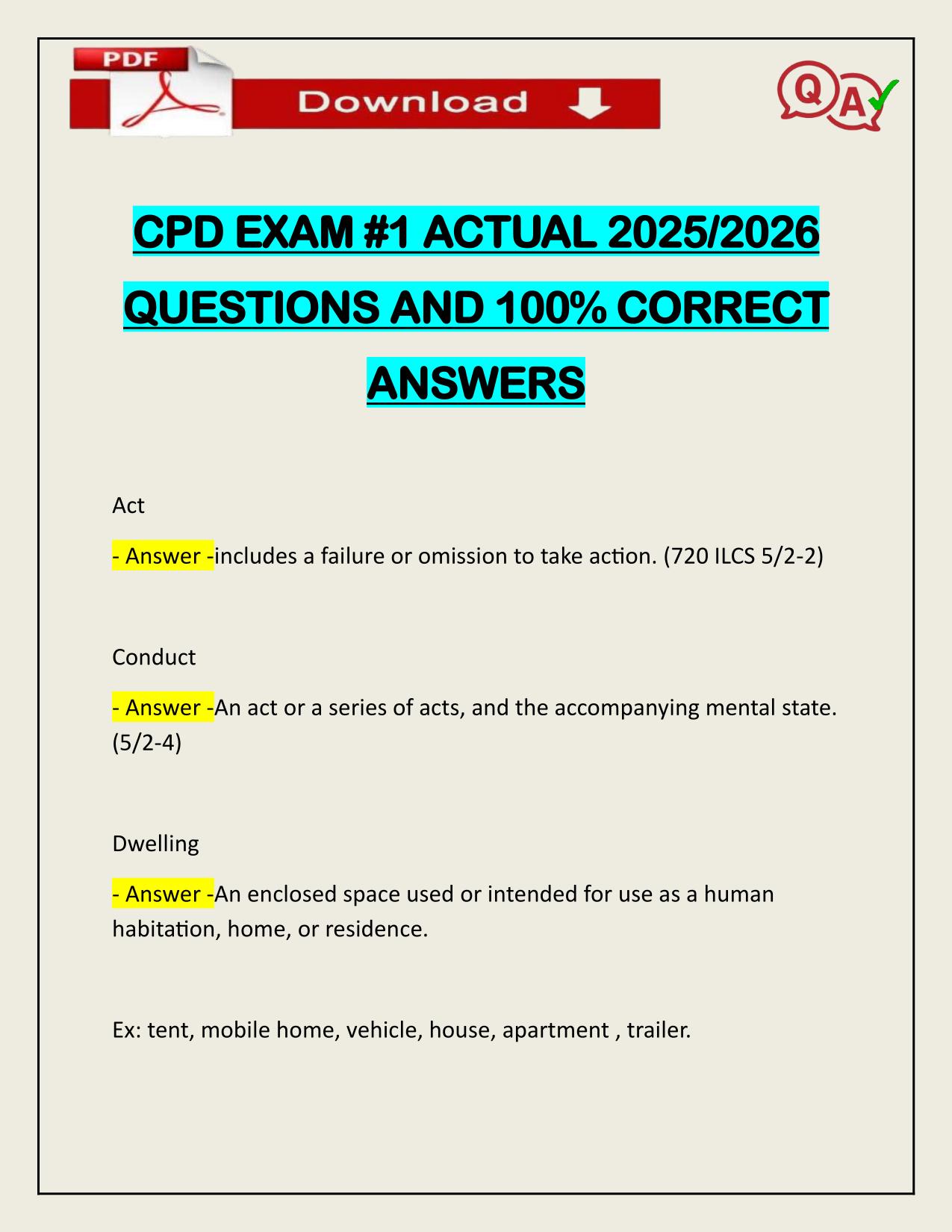CPD EXAM 6 ACTUAL 2025/2026 CORRECTLY ANSWERED
Course:
CPD SGT
Institution:
CPD SGT
CPD EXAM 6 ACTUAL 2025/2026 QUESTIONS AND 100% CORRECT ANSWERS 1. Define reasonable suspicion - Answer -n. Reasonable Suspicion is the amount of evidence which justifies an officer stopping a suspect to investigate crime. This type of seizure is know...
After purchase, you get:
✅ Instant PDF Download
✅ Verified answer explanations
✅ Refund if not Satisfied
✅ Prepared for 2025/2026 test cycle
Overview
Breakdown notes throughout the content provide additional context to support complex reasoning. These helpful asides offer deeper insight into why certain approaches work better than others. The extra context often makes challenging concepts click in ways that simplified explanations can't achieve. Many learners find these notes provide exactly the missing piece they needed to fully understand difficult topics.
Who Is This For?
Recommended for any student or trainee who needs systematic guidance and verified practice material for modern CPD SGT assessments. Many find it reduces their pre-exam anxiety. The reliable content helps users feel more secure in their knowledge. Developed for learners who prefer self-paced preparation with easy-to-follow explanations rooted in real exam formats. People appreciate being able to study at their own speed. The material builds naturally from basic concepts to more advanced applications.
Related Keywords
Detailed Study Description
Frequently Asked Questions
Document Information
| Uploaded on: | October 26, 2025 |
| Last updated: | November 17, 2025 |
| Number of pages: | 22 |
| Written in: | 2025/2026 |
| Type: | Exam (elaborations) |
| Contains: | Questions & Answers |
| Tags: | CPD EXAM 6 ACTUAL 2025/2026 QUESTIONS AND 100% CORRECT ANSWERS 1. Define reasonable suspicion - Answer -n. Reasonable Suspicion is the amount of evidence which justifies an officer stopping a suspect to investigate crime. This type of seizure is known as a Terry stop. |
Seller Information

AdelineJean
User Reviews (0)
Exam (Elaborations)
$9.00
Bundle Deal! Get all 6 docs for just $21.50
Add to Cart
100% satisfaction guarantee
Refund Upon dissatisfaction
Immediately available after purchase
Available in Both online and PDF
$9.00
| 0 sold
Discover More resources
Available in a Bundle
Inside The Document
CPD EXAM 6 ACTUAL 2025/2026 QUESTIONS AND 100% CORRECT ANSWERS 1. Define reasonable suspicion - Answer -n. Reasonable Suspicion is the amount of evidence which justifies an officer stopping a suspect to investigate crime. This type of seizure is known as a Terry stop. Circumstances when a stop is authorized. - Answer -1. When a police officer has a reasonable suspicion, based on articulable facts, that an individual may be engaged in unlawful conduct, or is about to commit a crime, the officer has the right to stop that individual and inquire as to his or her identity, purpose, and otherwise investigate the suspicions. Reasonable suspicion based on articulable facts requires that the officer be able to point to actual circumstances - FACTS - which make his or her suspicion reasonable. - Answer -1. Unsubstantiated hunches, or suspicion not backed up by facts, will justify neither the stop nor the frisk. 4. *Recognize circumstances when a frisk is authorized. - Answer -1. Incident to such a stop, IF the officer also has reasonable suspicion, based on articulable facts, which lead the officer to believe that the individual stopped could be armed and may be dangerous to the officer or to others, the officer may frisk the outer clothing of the person for purpose of determining whether the person is carrying a weapon. Frisk or pat down - Answer -limited search of outer garments for weapons only 1. According to Minnesota v. Dickerson, what else may an officer seize during a frisk? - Answer -Contraband Need assistance on Online classes, Exams & Assignments? Reach out for instant help!! Full Course Assistance, Plagiarism-free Essay Writing, Research Paper, Dissertation, Discussion Posts, etc…. Confidential & Secure services. Tutors are available for all subjects! Email now at: tutorjean01@gmail.com 1. According to Terry v. Ohio, what may the officer seize during a frisk? - Answer -Weapons 1. Describe the "scope of the frisk" (physically what is the officer doing and what is the officer searching for)? - Answer -- Patting outer clothing, looking for weapons or hard objects that can be used as a weapon (for your safety) 1. When is a "frisk" of a suspect lawful? - Answer -- Reasonable suspicion / person is armed and dangerous (not automatic) - After a lawful temporary detention - Limited search of outer garments for weapons only Contraband: - Answer -any property the possession or transportation of which is illegal. Typical examples are narcotics and illegal weapons. Keep in mind that this is what police are interested in searching for and seizing. "Open Fields" - Answer -are not protected by the Fourth Amendment. An open field is beyond the curtilage of the home. A person has no legitimate expectation of privacy in and open field and the police can look into that type of area without a warrant, without probable cause, regardless of the fact that the property is privately owned. Abandoned" - Answer -property is not protected by the Fourth Amendment. Trash put out on the curb, or property in which a person disclaims a possessory interest, are examples of abandoned property. Once property is abandoned the police may look in it and /or take it without a warrant, without probable cause. When is a search warrant required? - Answer -- Expectation of privacy 1. What is "contraband?" - Answer -- Any property the possession or transportation of which is illegal. Need assistance on Online classes, Exams & Assignments? Reach out for instant help!! Full Course Assistance, Plagiarism-free Essay Writing, Research Paper, Dissertation, Discussion Posts, etc…. Confidential & Secure services. Tutors are available for all subjects! Email now at: tutorjean01@gmail.com
CourseHero & Studypool Unlocks
Get Unlocked CourseHero and Studypool documents files instantly to your email, simply by pasting your link and clicking "Unlock Now". Learn more on how to unlock here.
